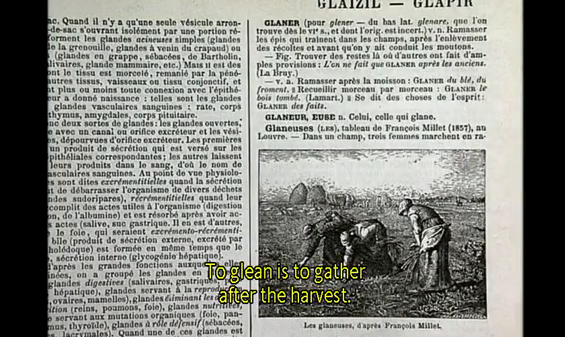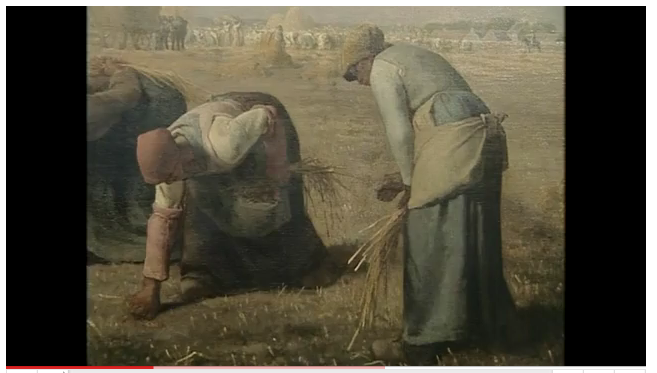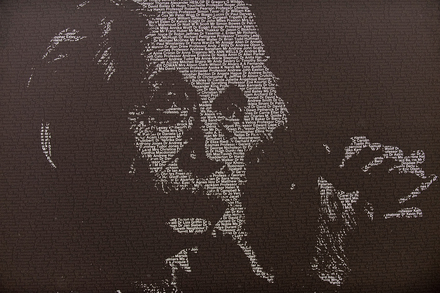
Scene from ‘The Gleaners and I’ – Introduction
The word Glean brings meaning according to Oxford dictionary (2010), 1) extract from various source, 2) collect gradually bit by bit or 3) gather. The action of gleaning once part of everyday life. I remembered my grandmother used to brings us to a bush to pick mushrooms, she know which mushroom to pick. At that time it was more due to the type of mushroom that she wanted is not sold in the market. It is one of the rare one, because people don’t know how to cook them. It was after the World War II, she discovered different ways of cooking and learn what type of fruit, mushroom, vegetable that she can pick around the bush (they grow wild) and cook. That is because it was hard to find food. People don’t have money to buy, but most important is not much things are easy to get in the market.. She always reminded us how hard her life has been, and that we should be grateful with what we have now. It was a hard life for her.. This stories from different scene after the World War II is parts of the whole gleaning activities we have with grandmother.. we were just a kid.. we did not to that for long.. we stop eating that mushroom, as the place we use to pick the mushroom have now been developed. And our gleaning activities stop there.
We seldom hear about gleaning in this modern world we live in. However, there are some countries that still we can find that the gleaning activities is still needed, mainly due to the need to life, to feed the hunger.. But in this documentary, the gleaning activities still can be found in a modern society, in France. The notion of gleaning have shifted, yes it still have to do with hunger but, some people still doing it because they against with the idea of wasting. Some of the products from the market are still eatable and in good condition, but still they get to be throw away because in two or three days (where the market will be closed) it will be bad. So they were thrown away.
This is a documentary made by Agnes Varda, based and inspired by a famous painting by realist painter Jean-François Millet’s “The Gleaners [Les Glaneuses] (1857)”. In her work she discuss about Why people glean? and What stimulate the process of gleaning?. It is an interesting and informative documentary to watch. I cannot post the embedded video here but I can include the link to the introduction of the documentary ‘The Gleaners and I’ by Agnes Varda (2000).

Jean-François Millet’s “The Gleaners [Les Glaneuses] 1857
This interesting article is from www.theconversation.edu.au written by Prof. Attila Brungs and Prof. Jim Mcnamara.
Foundation essay ” If we knew what it was we were doing,
it wouldnt be called research,
would it? While slightly flippant, this comment by Albert Einstein captures the unpredictability of research beautifully. There are many examples of this.
A mathematical approach which was first applied to using radio-telescopes to search for exploding black holes turned out to be fundamental to solving the wireless networking multipath problem.
That, in turn, led to CSIROs patented technology that underpins many of todays high speed wireless local area networks and inspired countless additional innovations and improvements to our way of life.
Breakthroughs in linguistics from UTS and other institutions allowed improved communication between hospital medical practitioners culminating in significantly improved patient outcomes.
Professor Hung Nguyen, Dean of Engineering and Information Technology at UTS, initially designed robots to play chess. After recognising the links between the artificial intelligence of robotics and neuroscience, he went on to focus one area of his research to utilise robotics for people with severe disabilities. That resulted in the development of the thought controlled wheelchair.
Significant breakthroughs such as these take a long time to develop, and there is a media friendly outcome at the end, making them an easy story to tell.
But for the full benefit of research to be achieved, it is critical that the outcomes of current research and the latest thinking are made accessible to the general public. And that means publishing not only traditional journal papers, conference presentations and books, but beyond.
The more obvious facets of research “ the latest in health and medical breakthroughs or must have gadgets, already shape the way we live.
However we sometimes forget the significance of research outcomes that enable our everyday decision making. They provide robust input to our opinions, or help foster an engaged community and shape public consciousness.
Research has the ability to provoke debate around some of the major global issues we are facing “ and in turn support fact-based government policy.
The case for communicating research is clear.
At one level it can help us make day to day decisions. Research conducted by UTSs Faculty of Nursing, Midwifery and Health revealed that if people suffering chest pains delay going to a hospital by just 15 minutes it significantly increases the chance of death.
And a novel IT approach is trialling the real time tracking of Sydney buses beamed directly to our smart phones.
Timely and public communication of research also provides the robust information and necessary evidence base which shapes critical policy decisions, industry investment choices or influences community groups.
Research outlining societys views towards tolerance and diversity provided the backbone for a recent session held in parliament on cosmopolitan and civil society.
Perhaps the most powerful aspect of research is its potential to act as a catalyst to stimulate and support public debate.
Climate change is undoubtedly one of the most challenging issues facing society today. The broad, accessible dissemination of the underpinning scientific evidence and potential solutions is fundamental to determining our response as a country.
Similarly, the latest research from the Global Phosphorus Network raises new issues such as the critical nature of the declining phosphorus stocks, and the implications for world food supply. Its an issue which has not yet seriously appeared on any governments radar, but it should.
The nature of research and how it can be utilised is changing. Multidisciplinary and ˜left field approaches are unquestionably the future trend for research. This is complemented by the breadth and diversity of new and digital media.
Research findings are now much more accessible to specialists in other fields. Industry and community members, too, can add to or use the original research in ways undreamt of by the researchers.
Take malaria. It threatens half the worlds population “ over 230 million cases are reported each year. A much wider audience was exposed to a potentially critical breakthrough when the Walter and Eliza Hall institute and UTSs i3 Institute published the first pictures of the malaria parasite in more accessible media channels, as well as academic literature. This could lead to innovative solutions to malaria being put forward from sectors of society completely unrelated to mainstream malaria research.
With these significant potential benefits, many universities and academics are putting significant time and effort in to broader engagement and attempts to engage the public consciousness.
There is a recognition by a number of us in the sector that were on a journey. Our efforts to support energetic media offices, proactive academics, and the adoption of new media channels is just the start. We are also increasing direct engagement with government and growing industry promoting programs such as public seminar series.
What are the challenges to more accessible research communication? Ironically it is often the pressure we put on our own academics. To be successful as academics we need to write for a critical academic community and contain theoretical constructs and abstraction which can, at times, present an impenetrable barrier to the non academic. Not just in terms of language, but also relevance.
The late Glenda Adams, an author and former UTS writing teacher, describes this beautifully in an essay in The Australian Author published shortly after her death in 2007. I sometimes feel that universities have placed a large pot of abstract nouns at their gates and to enter we must dip into the pot and take three abstract nouns and make something of them, she wrote.
Allowing academics the time to reframe their research to focus on the issues and outcomes which are relevant to a non-academic audience will allow greater accessibility.
The sheer amount of information generated during even one research project, which can run to many publications, conference papers and more, is also an intimidating barrier to even the most inquisitive citizen.
It is clear, quite rightly, that we are entering a period with increased emphasis on the demonstration of value for money of publically funded research.
The results of the first round of Excellence for Research Australia have recently been published. While very thorough, this exercise focused necessarily on elements including publications and citations which are essentially meaningless to the general public and was unable to include broader metrics on the impact of research on society.
Essentially, we have a dichotomy set up which needs to be carefully managed. We need to balance the drive towards a focused definition of quality which will direct funding, against the need to ensure that our publically funded research has the broadest possible impact in society.
The mainstream media have an important role in communicating research outcomes, and providing informed rather than sensational commentary on the issues that affect society. I believe that this is still not happening enough. There is sometimes an assumption (an incorrect one) that the general public does not want, or cannot cope with a complex, knowledgeable debate.
I believe that universities and researchers have a vital role to play in stimulating relevant, evidenced based discussion as part of their research activities.
Research is always outward looking, driven by a desire to change and improve the world around us.

